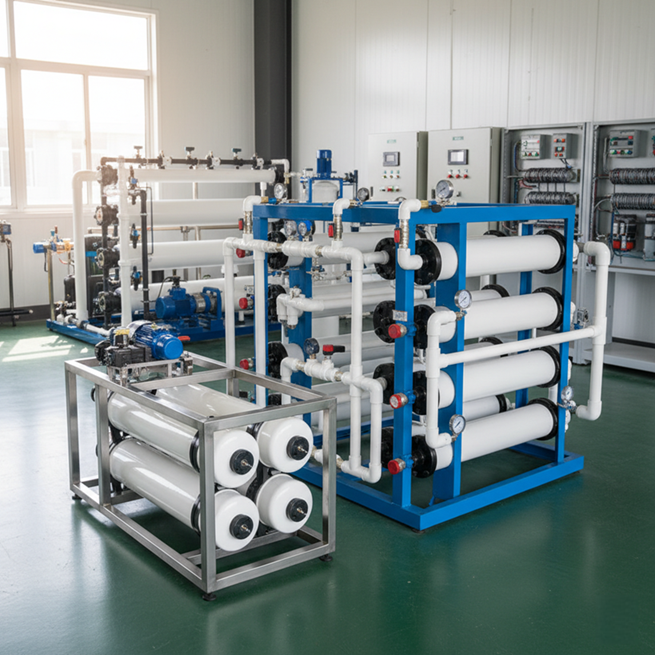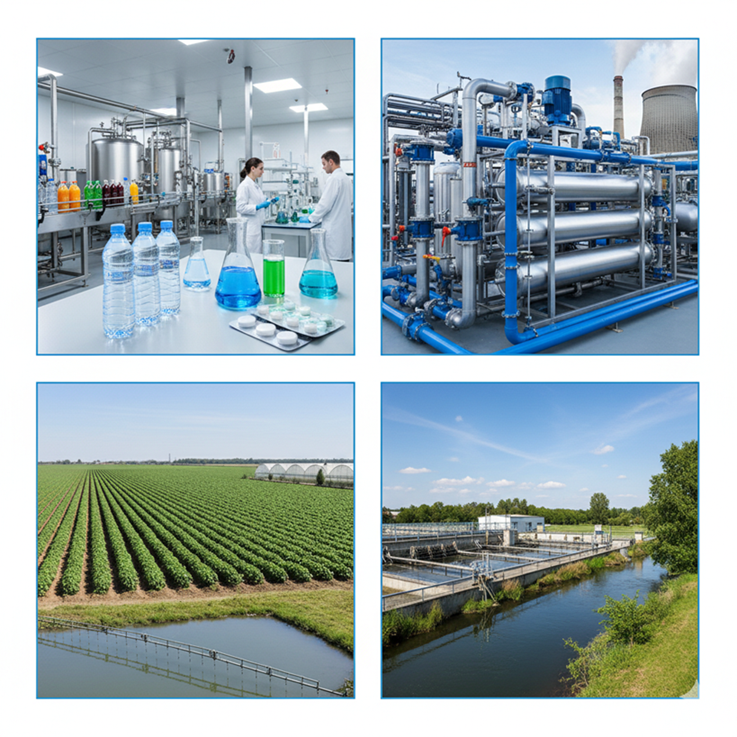
Types of Commercial Reverse Osmosis Systems
Commercial reverse osmosis systems are specialized water purification technologies used across various industries to efficiently produce high-quality water to meet operational needs. Using a semi-permeable membrane, these systems effectively remove impurities, dissolved solids, and contaminants, making them essential in various sectors. Such as pharmaceuticals, food and beverages, and manufacturing, where water quality is critical to product safety and operational compliance.
The growing demand for clean water in industrial applications, coupled with increasing regulatory standards, has established commercial reverse osmosis systems as a vital investment for many businesses. Reverse osmosis systems are available in a variety of configurations, including single-stage and multi-stage systems. Each is designed to meet specific operational and water quality requirements. While single-stage systems are suitable for small-scale applications due to their simple design and cost-effectiveness, multi-stage systems offer improved efficiency and higher purity levels, making them preferred for more demanding industrial processes.
Additionally
Advances in membrane technology have led to the development of specialized membranes for brackish water and seawater applications, allowing greater flexibility in meeting diverse water treatment needs. Despite their numerous advantages, commercial reverse osmosis systems also face challenges. Initial setup costs can be high, and ongoing maintenance is necessary to ensure system performance and longevity. Furthermore, wastewater generation during the purification process raises environmental concerns, necessitating effective waste management strategies.
With industries increasingly focusing on sustainability, the integration of energy-efficient technologies and the use of renewable energy sources are emerging trends that seek to mitigate the environmental impact of reverse osmosis systems while enhancing their overall efficiency. In short, commercial reverse osmosis systems represent a critical solution for large-scale water purification across various sectors, driven by their ability to deliver high-quality water while adapting to specific industry needs. As the market evolves, ongoing innovation and a commitment to sustainability will play a significant role in shaping the future of commercial reverse osmosis technology.
Commercial Reverse Osmosis Systems Overview
Commercial reverse osmosis systems are advanced water treatment solutions designed to meet the purification needs of large volumes of water in various industries. These systems use a semi-permeable membrane to effectively remove impurities from water, ensuring a consistent supply of clean water, which is essential for operational efficiency in sectors such as pharmaceuticals, food and beverages, and manufacturing.
Operating Principles
Commercial reverse osmosis systems begin with pretreatment processes that remove larger particles and contaminants. This may include technologies such as sediment filtration, activated carbon filtration, and sometimes water softening. The main reverse osmosis process forces water through semi-permeable membranes under pressure. This selectively allows water molecules to pass through while preventing dissolved solids and other unwanted materials.
Customization and Capacity
One of the most important advantages of commercial reverse osmosis systems is their customizability to meet specific operational requirements. These systems can be designed to fit space constraints, and their filtration capacity can be adjusted to suit the requirements of the industry they serve.
For example, companies requiring large quantities of purified water can choose systems with enhanced capacity and efficiency, which also feature advanced automated monitoring and control systems to ensure optimal performance.
Maintenance and Support
To maintain the effectiveness of reverse osmosis systems, proper pretreatment is critical. This includes addressing issues such as fouling and sedimentation, which can lead to premature membrane failure.
Regular maintenance and strong customer support are essential to ensuring the long-term reliability and efficiency of commercial reverse osmosis systems.
Applications in Various Industries
Commercial reverse osmosis systems are versatile, serving a wide range of applications across various sectors. They are used in environments such as universities, laboratories, breweries, and agricultural environments, demonstrating their adaptability to various water purification needs. The consistent quality of the treated water contributes to improved product quality and customer satisfaction, making them a vital investment for many companies.
An important article explaining the factors to consider before choosing a commercial reverse osmosis system.
Types of Commercial RO Systems
Commercial reverse osmosis (RO) systems are designed in a variety of configurations to meet the specific needs of various industries and applications. These systems can vary in complexity and size, accommodating a wide range of water quality requirements and production capacities.
System Configurations
Single-Stage Systems
Single-stage reverse osmosis systems consist of a single set of pressure vessels containing reverse osmosis membranes. Making them suitable for applications with low water purification requirements. These systems are generally simpler and less expensive to install and maintain, but may not achieve the same purity levels as multi-stage systems.
Multi-stage systems
Multi-stage reverse osmosis systems incorporate two or more filtration stages, where the ejection (or concentration) from one stage serves as the feed source for the next stage. This configuration allows for greater efficiency and higher purity levels by enabling. The system processes larger volumes of water efficiently while improving salt rejection rates.
- Two-stage systems: These systems are often used in industrial applications. Where they improve recovery rates and enhance purification through successive filtration stages.
- Solution Three: These systems are typically designed for the most demanding applications. Providing maximum efficiency and water quality through the use of multiple membrane combinations.
Membrane Types
Brackish Water Membranes
Brackish water membranes are designed to operate at low pressure and are typically used for feedwater with total dissolved solids (TDS) levels below 35,000 mg/L. These membranes are effective at rejecting salts and impurities while maintaining a high extraction rate.
Seawater Membranes
Seawater membranes are designed for feedwater with high total dissolved solids (TDS). That requires much higher operating pressures (800-1200 psi) to operate effectively. These membranes are essential for seawater desalination applications, achieving high levels of salt rejection and water purity.
Nanofiltration Membranes
Nanofiltration (NF) membranes fall between reverse osmosis and ultrafiltration in terms of pore size and operational parameters. They are often used in applications that require the removal of small particles and some dissolved materials without completely removing all salts, making them suitable for some food and beverage applications.
Application-Specific Configurations
Commercial RO systems can be further customized to meet specific sector needs. Features such as automated control systems, real-time monitoring, and tailored filtration capabilities can be incorporated into the design. Ensuring optimal performance under unique operating conditions.
This customization is essential in industries such as pharmaceuticals, food and beverage production, and electronics manufacturing. Where water quality directly impacts product safety and compliance with regulatory standards.
In Conclusion
Commercial RO systems are not just an option. They are a vital investment to ensure operational efficiency and compliance with quality standards in any sector. Whether your requirements call for a cost-effective single-stage system, a multi-stage system designed for maximum purity, or even a specialized seawater membrane desalination system. The solution lies in a careful design tailored to your specific application.
The complexity and installation, and operation requirements of these systems underscore the importance of partnering with a trusted expert. At our company, we specialize in the design and construction of integrated water treatment plants. We offer not only reverse osmosis technology, but also a comprehensive engineering solution. That ensures the highest levels of recovery and efficiency. You can view a selection of our previous projects.

























